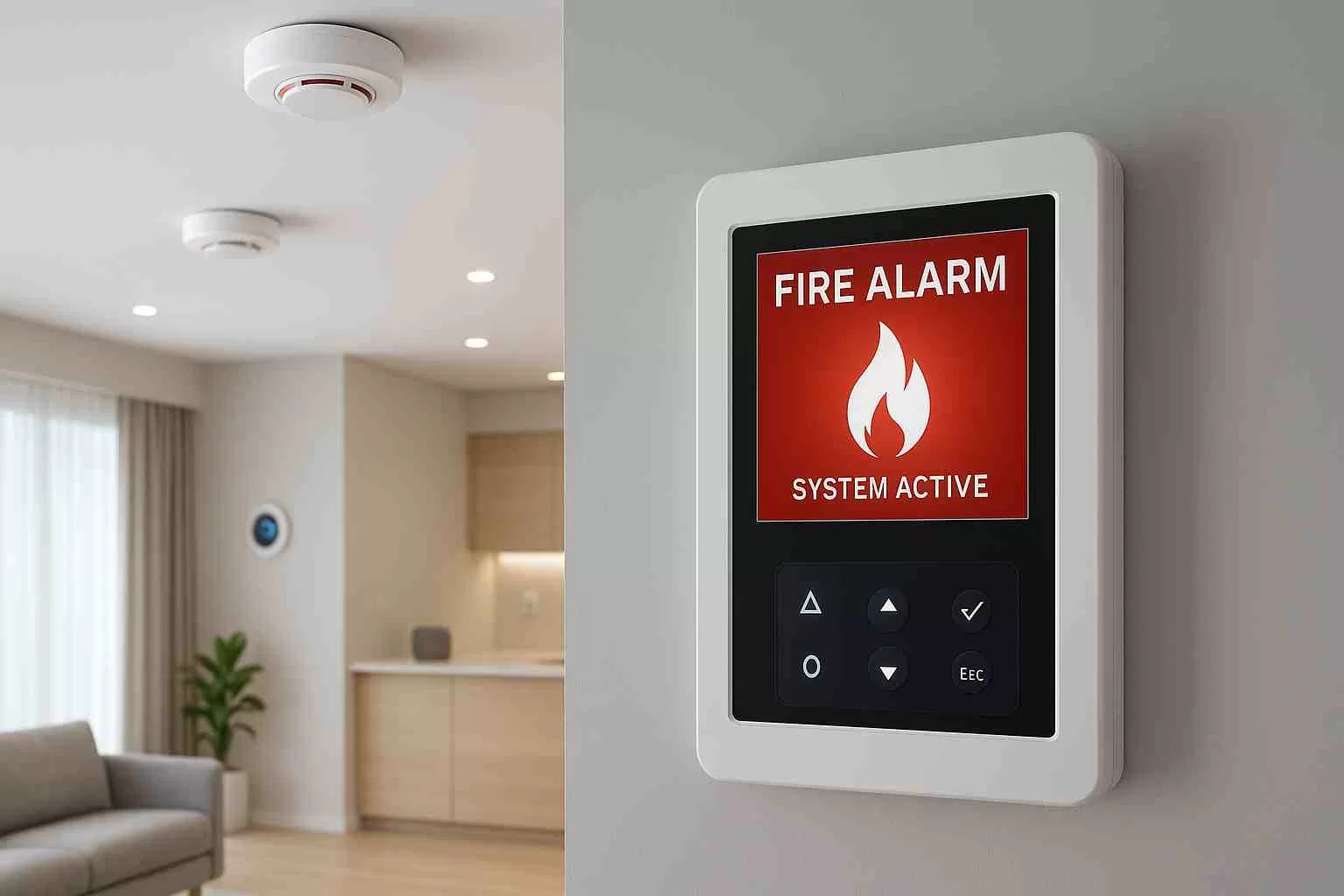
A Loud Alarm Could Save Your Life—Are You Listening?
Protect lives and property with a reliable fire alarm. Learn how modern fire alarm systems work, why you need one, and how to choose the best.
Every 23 seconds, a fire breaks out in the world. That’s over 3,700 fires every single day.
Now imagine this: Your home catches fire while everyone is asleep. Will you hear the warning in time to escape?
Without a functioning fire alarm system, that answer may tragically be “no.”
In this blog, we’re diving deep into the fire alarm—how it works, why it matters, and what you need to know to make the smartest choice for your home or business. Whether you’re a homeowner, a facility manager, or a business owner, this is your guide to fire safety in a world where seconds count.
Central Message: A reliable fire alarm system isn’t just a compliance measure—it’s a life-saving decision that can protect everything and everyone you care about.
What Is a Fire Alarm System and How Does It Work?
A fire alarm is a comprehensive system designed to detect fire early and alert occupants via audible and visual signals.
Key Components of a Fire Alarm System
- Smoke Detectors – Sense smoke and trigger the alarm.
- Heat Detectors – Detect temperature changes and fire risk.
- Manual Pull Stations – Allow individuals to trigger the alarm manually.
- Control Panel – The brain of the system, it manages signals and alerts.
- Alarm Notification Devices – Buzzers, strobe lights, or voice systems to notify people.
- Communication Systems – Integrate with emergency response or central monitoring.
When the system detects smoke or heat, or someone activates it manually, it sends an alert. In advanced systems, it can also notify emergency services automatically.
Why a Fire Alarm System Is Non-Negotiable
1. Fire Alarms Save Lives
According to the National Fire Protection Association (NFPA), working smoke alarms reduce the risk of death by over 50% in home fires. That’s not a small margin—it’s life or death.
2. Protects Property & Assets
A fire can destroy your business inventory, documents, electronics, or priceless family heirlooms. A fire alarm detects threats early and helps contain damage.
3. Early Detection = Faster Response
The faster a fire is detected, the sooner emergency services can arrive, minimizing loss and increasing survival rates.
4. Meets Legal & Insurance Requirements
Many commercial and residential buildings are legally required to have certified fire detection system systems. And in many cases, insurers demand them too.
5. Peace of Mind
You sleep better knowing your alarm system has your back—even when you’re not home.
Different Types of Fire Alarms You Should Know
Not all fire alarms are created equal. Here are the most common types:
1. Ionization Smoke Alarms
Best for detecting fast-flaming fires (like paper or grease fires). These alarms are quick but prone to false triggers.
2. Photoelectric Smoke Alarms
Better at detecting smoldering fires (like electrical or bedding fires). Ideal for bedrooms and living spaces.
3. Heat Detectors
Trigger based on rising temperature, perfect for kitchens or garages where smoke may be common.
4. Combination Alarms
Dual-sensor alarms offer the best of both worlds—detecting both smoldering and flaming fires.
5. Smart Fire Alarms
Wi-Fi-enabled systems that connect to your smartphone, send alerts remotely, and integrate with smart home systems.
How to Choose the Right Fire Alarm System
Consider the Following:
- Size of Property – Larger areas may need interconnected alarms.
- Purpose of the Space – Commercial setups need more complex systems than homes.
- Occupant Type – Olderly or children may need strobe lights or voice alarms.
- Local Regulations – Follow BIS standards, NFPA codes, or other national fire codes.
- Smart Features – Consider mobile alerts, voice instructions, and system diagnostics.
Professional Installation vs. DIY
For small apartments, battery-operated DIY alarms may suffice.
But for homes, offices, or buildings, professional fire alarm installation ensures compliance, coverage, and performance.
Fire Alarm Maintenance: Don’t Install and Forget
Like all life-saving devices, fire detection system need regular care:
- Test Monthly – Press the test button on your unit.
- Change Batteries Annually – Or sooner if you hear chirping sounds.
- Clean Sensors – Dust buildup reduces sensitivity.
- Replace Every 10 Years – Alarms degrade over time.
🚨 Fact: 3 out of 5 home fire deaths occur in homes without working smoke alarms.
Integrating Fire Alarms with Other Safety Systems
Fire alarms aren’t standalone—they can work with:
- Sprinkler Systems – Trigger water suppression when alarms activate.
- CCTV Surveillance – Provide visual confirmation of fire.
- Access Control Systems – Automatically unlock exits for safe evacuation.
- Mobile Notification Apps – Alert you when you’re away from the premises.
This integration offers layered protection, covering detection, suppression, and evacuation.
Legal Compliance and Certification in India
In India, fire alarm systems must comply with BIS Standards (IS 2189). Key regulatory bodies include:
- Bureau of Indian Standards (BIS)
- Fire Department / Municipal Safety Guidelines
- National Building Code (NBC)
Get your system certified by approved authorities to avoid penalties and ensure insurance validity.
Best Fire Alarm Brands in India
- Honeywell – Trusted globally, with scalable systems.
- Agni Instruments – Known for affordability and reliability.
- Siemens – Premium fire detection and control.
- Ceasefire – Integrated fire detection system and suppression systems.
- Morley IAS – Advanced addressable fire detection systems.
Common Mistakes to Avoid
- Ignoring Maintenance – Dust and battery failure are silent killers.
- Wrong Placement – Avoid kitchens or bathrooms unless using heat detectors.
- No Interconnection – A fire in one room should alert the whole house.
- No Escape Plan – Alarms are useless if you don’t know what to do next.
Fire Alarm Myths—Busted!
- Myth: “I’ll smell the fire before it’s dangerous.”
Truth: Most fire deaths are from smoke inhalation during sleep—you won’t smell anything. - Myth: “One alarm is enough.”
Truth: You need at least one per floor, and ideally inside every bedroom. - Myth: “Sprinklers will make a mess unnecessarily.”
Truth: Sprinklers are heat-triggered—only active where fire occurs.
Final Thoughts: A Sound Investment in Safety
A fire alarm system is not a luxury—it’s a necessity. It provides early detection, peace of mind, and most importantly, saves lives. Whether you live in a single-bedroom flat or manage a multi-storey office, choosing and maintaining the right fire alarm system could be the best decision you ever make.
Your Turn!
Have you tested your fire detection system this month?
Tell us in the comments, share your fire safety tips, or contact our experts to get a customized fire detection plan for your property.
Ready to Protect What Matters?
Call Now 9150012345 or WhatsApp
Electronic Security | Security Systems | Video Surveillance | Burglar Alarm

